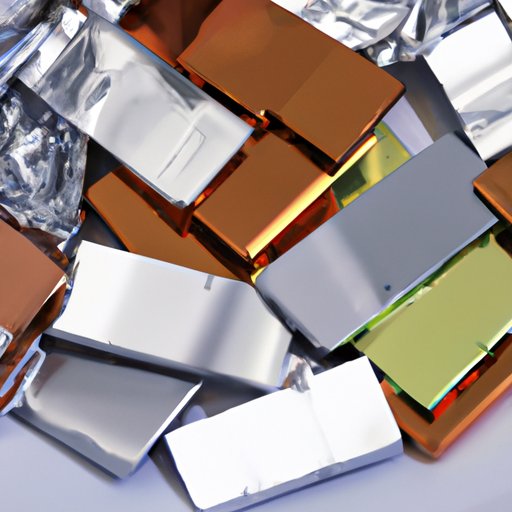I. Introduction
Electrical conductivity refers to the ability of a material to conduct electric current. Essentially, it is the ability of a material to allow the flow of electrons through it. In this article, we will dive into the various metals that are commonly used for electrical conductivity and compare how they rank in terms of their conductivity properties.
II. Comparing Conductivity Properties of Different Metals: An In-depth Analysis
The conductivity of a metal is determined by its atomic and crystalline structure. Conductivity testing methods can include direct current resistance and inductance methods, as well as other methods such as Hall effect, which checks the movement of charge carriers in a magnetic field.
Some of the most commonly used metals for electrical conductivity include copper, silver, gold, and aluminum. Copper, for example, has a high conductivity rating due to its structure, with a single atom of copper having only one free electron in its outermost energy level. This makes copper an excellent conductor of electricity. Silver is another excellent conductor, being the most conductive element known to man. However, silver can be expensive and not always the most practical for certain electrical applications. Gold, while extremely conductive, is also expensive and very soft. Aluminum, on the other hand, has a lower conductivity rating compared to copper and silver but is a more cost-effective alternative.
III. Conducting the Conductivity: Discovering the Best Metal for Electrical Conductivity
When choosing the best metal for electrical conductivity, there are several factors to consider. One factor is the conductivity properties of the metal. Copper, silver, and gold are the most conductive options available, with silver being the most conductive, followed by copper, and then gold.
Another factor to consider is the specific application the metal will be used for. For example, silver may be the most conductive metal, but it is not always the most practical or cost-effective option. Copper is often the most suitable option for applications where high conductivity is required, such as electrical wiring, due to its reasonable cost and excellent conductivity.
IV. The Ultimate Showdown: Which Metal Conducts Electricity the Best?
After conducting various conductivity tests, the metal with the highest electrical conductivity is silver. Silver has the highest conductivity rating, with a rating of 63 x 10^6 siemens/meter. Copper comes in second place, with a rating of 59.6 x 10^6 siemens/meter, and gold follows in third place with a rating of 44.9 x 10^6 siemens/meter.
V. The Science Behind Electrical Conductors: Identifying the Most Effective Metals
The conductivity of a metal is closely related to the strength of an electric field produced by the movement of charge carriers through the material. The atomic structure, number of free electrons, and electron mobility are all factors that can affect the conductivity of a metal.
Other factors that play a role in the conductivity of a metal include temperature, composition, and purity. In general, metals that have a high atomic number and high electron mobility will have higher conductivity ratings.
VI. The Battle for Conductivity Supremacy: Which Metal Takes the Crown?
After analyzing the conductivity results of each metal, the most effective metal for electrical conductivity depends on the specific application. For high conductivity applications, copper is the most commonly used metal due to its cost-effectiveness and excellent conductivity.
However, in other applications, such as electronics, silver may be a better option due to its superior conductivity rating. In applications where durability is important, aluminum may be the best choice, as it is more resilient than copper or silver.
VII. The Conductivity Conundrum: Understanding Which Metal is the Best for Electrical Needs
Electrical conductivity is essential in a wide range of applications, from electrical wiring to electronic devices. In electrical devices, conductivity can affect the device’s performance, efficiency, and safety.
For example, in electronic circuits, the conductivity of different metals can have an impact on the resistance, which in turn can have an effect on the circuit’s operation. In electrical wiring, the conductivity of a metal can affect the amount of current that can be safely transmitted. The choice of metal for an application will depend on several factors, including cost, conductivity, durability, and safety.
VIII. Measuring Conductivity: Determining the Best Metal for Electrical Efficiency
Conductivity can be measured using various methods, including using a conductivity meter, which measures the electrical resistance of a sample and calculates its conductivity rating. Other methods include four-point probes, eddy current testing, and Hall effect testing.
The most accurate method of measuring conductivity will depend on the specific material and the application of interest. Conductivity measurements play a significant role in determining the best metal for electrical efficiency in different applications.
IX. Conclusion
Overall, the best metal for electrical conductivity ultimately depends on the specific application’s needs. Copper is the most commonly used metal for high conductivity applications due to its cost-effectiveness and excellent conductivity rating. However, silver and gold are superior conductors and may be more appropriate for other applications, such as electronics. Conductivity measurements are essential in determining the best metal for different electrical applications.
